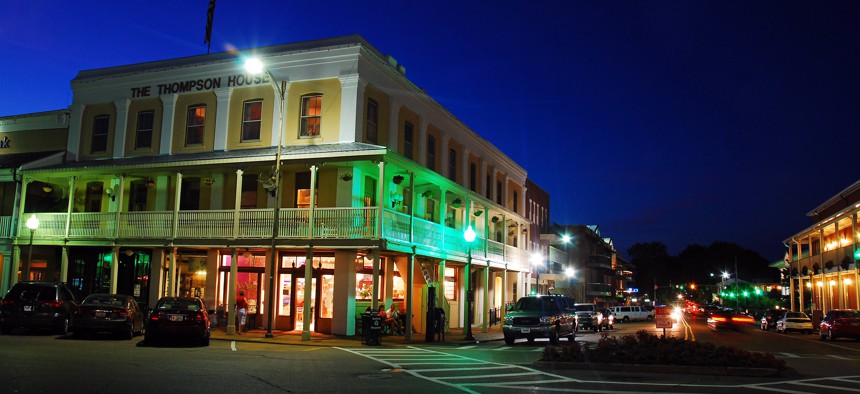Local Leaders Visit D.C. to Oppose Possible Spending Clawbacks, Cuts

Oxford, Mississippi in 2010. Shutterstock

Connecting state and local government leaders
Mayors and others who took part in the lobbying effort are part of a newly formed coalition of small and mid-sized communities.
WASHINGTON — Leaders from small and medium-sized localities across the U.S. made a case here Tuesday for funding a range of federal programs they say are crucial for community development, amid concerns over possible spending clawbacks and cuts.
Their visit comes as the Trump administration is looking to rescind some funding included in a 2018 spending bill enacted last month. The White House has also called for slashing a slate of programs that funnel money to states and localities in fiscal 2019. So far during President Trump's tenure, Congress has largely rejected such cuts.
"These programs create growth," Steve Williams, mayor of Huntington, West Virginia, told Route Fifty. "We don't have the resources in our communities to get started on some things," he added. "A $100,000 grant, that might be able to turn into $5 million of investment."
Williams was one of 30 local officials who took part in Tuesday's visit, which was organized under the umbrella of a coalition dubbed First & Main—a project of the advocacy group Smart Growth America.
The coalition is promoting a "blueprint" with 36 strategies that include recommended funding levels for federal programs.
They've outlined five broad categories that these strategies fall under: redevelopment and revitalization; local economic development; rebuilding downtown and core areas; housing and neighborhoods; and infrastructure investment.
Examples of strategies include: Reauthorizing the U.S. Environmental Protection Agency's Brownfields program (commonly used to redevelop old industrial sites) at $250 million each year; funding certain U.S. Department of Agriculture Rural Development programs at $2.3 billion annually; and creating a $100 million "public square initiative" to provide National Park Service grants to support the design and construction of parks, waterfronts and other public spaces.
“We’re worried that Washington may not recognize the importance of these federal programs and resources that are driving local revitalization," Mayor Robyn Tannehill, of Oxford, Mississippi, said at a briefing for congressional staff detailing First & Main's platform.
Mayor Svante Myrick, of Ithaca, New York, described during the briefing how his city worked with the Federal Transit Administration to secure a $4.5 million grant that went toward a $15 million project to rebuild an outdated, downtown pedestrian mall.
He said the project ended up spurring two new hotel projects, five apartment complexes and other development. "We generated over $300 million worth of direct construction investment," Myrick said.
First & Main formally launched March 1, but local leaders worked with Smart Growth America for about a year developing the blueprint, according to a spokesman for the group.
On Tuesday, the visiting officials had 28 meetings scheduled on Capitol Hill. They also planned to meet with White House intergovernmental affairs, urban affairs and revitalization, and Office of Public Engagement staff, the spokesman said.
Increases in the March omnibus spending bill marked a bright spot for many local leaders who, during the Trump era, have fought to defend funding for programs like Community Development Block Grants, and initiatives that support infrastructure and housing.
Congress crafted the spending legislation under a broader two-year budget deal that relaxed budget caps established in 2011.
Trump signed the fiscal 2018 omnibus begrudgingly, saying he would "never sign another bill like this again." The measure did include big defense spending increases, but did not align with other key elements of the president's agenda.
Over the weekend, Trump's legislative affairs director, Marc Short, indicated during an appearance on NBC's "Meet the Press," that the White House would urge lawmakers to consider a "rescissions" package, with proposals to cancel approved spending.
The administration has yet to release the package, and it is unclear what programs it might target. "In many cases, what I think you’ll see us putting forward are dollars that have been left over in programs for years that are not being utilized," Short said.
Senate Majority Leader Mitch McConnell, of Kentucky, has cast doubt on whether the spending bill, a product of significant negotiations in Congress, would be reworked. He told Fox News last week: “You can’t make an agreement one month and say, 'OK, we really didn’t mean it.'"
Bill Lucia is a Senior Reporter for Government Executive's Route Fifty and is based in Washington, D.C.

NEXT STORY: Kraken Crypto Exchange Responds to New York Attorney General in Snarky Way





